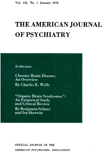The need for continuous use of antiparkinsonian medication with chronic schizophrenic patients receiving long-term neuroleptic therapy
Abstract
In this double-blind six-week study, 98 chronic schizophrenic patients receiving long-term neuroleptic treatment and trihexyphenidyl were switched to either placebo or study trihexyphenidyl. Fifty-one (68%) of the 75 patients given placebo versus 1 of the 23 patients who continued on active trihexyphenidyl developed severe worsening of extrapyramidal signs, necessitating early termination from the study. Twenty-one (28%) of the placebo patients versus 2 (8.7%) of the trihexyphenidyl patients developed less severe worsening. Furthermore, 50 (66.6%) of the placebo patients but only 2 (8.7%) of the trihexyphenidyl patients had psychotic or other severe physical symptoms related to withdrawal of prestudy antiparkinsonian medication. The authors conclude that these data support the need for continuous use of antiparkinsonian medication in the long-term neuroleptic therapy of chronic schizophrenic patients.
Access content
To read the fulltext, please use one of the options below to sign in or purchase access.- Personal login
- Institutional Login
- Sign in via OpenAthens
- Register for access
-
Please login/register if you wish to pair your device and check access availability.
Not a subscriber?
PsychiatryOnline subscription options offer access to the DSM-5 library, books, journals, CME, and patient resources. This all-in-one virtual library provides psychiatrists and mental health professionals with key resources for diagnosis, treatment, research, and professional development.
Need more help? PsychiatryOnline Customer Service may be reached by emailing [email protected] or by calling 800-368-5777 (in the U.S.) or 703-907-7322 (outside the U.S.).



